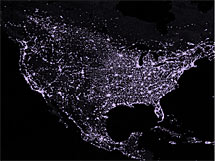

Monday - May 10, 2010
SLAC Today is
available online at:
http://today.slac.stanford.edu
In this issue:
People: Encouraging Girls to Explore Science
SMART Walkthrough Data Entry System Updated
SSUN Energy Summer School 2010: Addressing Energy Challenges in the Future Electric Grid
Colloquium Today: Gravitational Optics—Measuring Distances in the Universe with Galaxy-sized Lenses
 |
 |
|
Monday - May 10, 2010 |
People: Encouraging Girls to Explore ScienceExpanding Your Horizons Network members including SLAC researcher Cherrill Spencer
(center) hold up the award plaque at the U.S. State
Department. (Photo courtesy
Cherrill Spencer.)
Cherrill Spencer was on hand May 4 to see the Expanding Your Horizons Network receive the 2010 National Science Board's Public Service Award. Spencer, a magnet engineer at SLAC, has played a variety of leadership roles with the EYH Network for the past 29 years. This award was presented at a banquet at the State Department in Washington, DC. Expanding Your Horizons Network is a non-profit organization that runs conferences for middle and high school girls. The workshops feature women scientists and engineers, who lead hands-on demonstrations to pique young girls' interest in math, science and engineering. Spencer first became involved in EYH in 1978, when the organization was in its infancy. It started out in 1976 as a small conference at Mills College, limiting participants to the Bay Area. Spencer led a workshop at a similar conference at Foothill College in 1978. "I saw how much the girls enjoyed it, and the following year I joined the organizing committee at San Jose State University," she said. "We try to make it fun, and plan the workshops so the girls can be successful in the hands-on experiments." Read more... SMART Walkthrough Data Entry System UpdatedOne of the key attributes of an excellent safety management system is that line managers periodically take steps to reinforce safety with personal visits and walkthroughs to verify that their expectations are being met. Line managers:
SSUN Energy Summer School 2010: Addressing Energy Challenges in the Future Electric Grid Registration is now open for the SLAC, Stanford University and NREL Energy Summer School, August 9-20, 2010 at Stanford University. Scientific and technological advances will be key to addressing the energy challenges of the 21st century, in which global energy needs will more than double by 2050. This summer school will provide an overview of current issues and sustainable technologies in the energy cycle from generation, collection, storage, distribution and utilization. This year sessions will focus specifically on the challenges of modernizing our nation's electricity infrastructure to develop power systems that are intelligent, efficient, robust and secure. For full details, see the SSUN Energy Summer School Web site. Colloquium Today: Gravitational Optics—Measuring Distances in the Universe with Galaxy-sized LensesToday at 4:15 p.m. in Panofsky Auditorium, Stanford University and SLAC astrophysicist Phil Marshall will present a colloquium on gravitational optics. Understanding the mysterious "Dark Energy" that appears to be driving the expansion of the Universe is one of the biggest challenges to science in the 21st century. While offering no such new understanding, Marshall will describe a method for at least quantifying the effect of the dark energy that is both new and old. Old because the time delays between the multiple images of gravitationally lensed quasars have long been known to enable a measurement of the Hubble constant, and new because researchers have recently shown how with careful modeling of enough high quality data we can achieve comparable accuracy to other, complementary, better known cosmographic probes. After introducing and describing this experiment in some detail, Marshall will discuss how scientists plan to build on it in the next decade, using the Large Synoptic Survey Telescope to find, measure and select large numbers of suitable systems. The colloquium is free and open to all. Next Monday, Lawrence Berkeley National Laboratory researcher Art Rosenfeld will present the Monday colloquium. |
Events (see all | submit)
Access (see all)
Announcements
|
|
| | ||
|
|
||
 <%
Response.AddHeader "Last-modified", getArticleDate()
'Response.AddHeader "Last-modified","Mon, 01 Sep 1997 01:03:33 GMT"
'Monday, December 06, 2010
%>
<%
Response.AddHeader "Last-modified", getArticleDate()
'Response.AddHeader "Last-modified","Mon, 01 Sep 1997 01:03:33 GMT"
'Monday, December 06, 2010
%>View online at http://today.slac.stanford.edu/. |
||